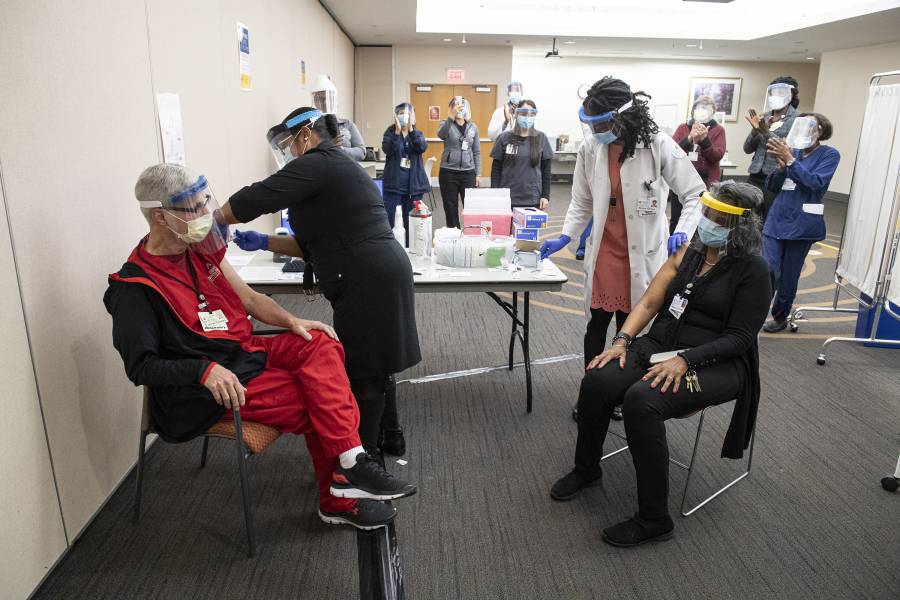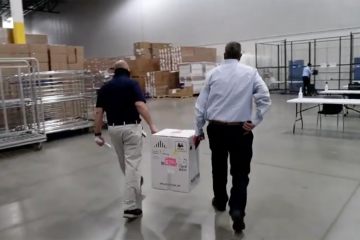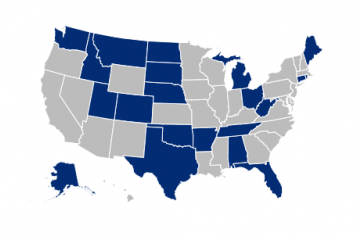At 7:30 on the cold and windy morning of Dec. 16, Kelly Casey got a history-making shot in her left arm.
Seated at a folding table on the concourse of the Thomas B. Turner Building on The Johns Hopkins East Baltimore campus, Casey was the first employee at Johns Hopkins Hospital to be vaccinated against COVID-19.
"I decided to get the vaccine after seeing a lot of pain and suffering in our patients and our co-workers," said Casey, an occupational therapist who works with patients throughout the hospital, including in COVID-19 units. She often works with patients being treated for COVID-19, from the intensive care unit through to discharge. She's also the mother of two young girls, and the worry of what infections she might bring home with her from work—or from home back to her colleagues and patients—weighed on her.
"That worry has really plagued us health care workers," said Panagis Galiatsatos, a pulmonary and critical care medicine physician specializing in obstructive lung disease and the care of critically ill patients in the hospital's ICU. "The vaccine won't take the place of personal protective equipment, but it gives us more confidence that we aren't bringing the disease home to our families."
For the bulk of 2020, Johns Hopkins physicians, nurses, and other staff members have cared for patients sick with the highly contagious coronavirus that has ground much of the world to a halt. The vaccine arrived during a week of record-high COVID-19 infections and deaths in Maryland and across the United States.
Manufactured by Pfizer-BioNTech, which shipped 975 initial doses to the Johns Hopkins Consolidated Service Center on Dec. 14, the vaccine must be stored at 70 degrees below zero Fahrenheit, and can only be out of deep-cold storage for the few minutes it takes to pack safely into a box and the few minutes it takes to administer the injection.
In a kind of dress rehearsal the day before Casey's historic inoculation, the teams responsible for storing, packing, transporting, and administering the vaccine practiced and refined the intricate processes they spent months designing to ensure maximum safety and efficiency.
Here it is.#science #CovidVaccine
— Panagis Galiatsatos, MD, MHS (@panagis21) December 16, 2020
pic.twitter.com/cwk7jHYcVq
"Countless hours have gone into preparing for this moment," chief supply chain officer Burton Fuller said after Tuesday's dry run. "Our supply chain team, our pharmacy, and our clinical and operational leadership made sure that we not only have the freezers to store the vaccine, but also the process through which we can distribute it to the employees on the front lines who are so eager to have it."
Authorized on Dec. 11 for emergency use by the U.S. Food and Drug Administration, the Pfizer vaccine requires two doses administered 17 days apart. A second vaccine from pharmaceutical company Moderna was granted the same conditional FDA approval Dec. 18. Johns Hopkins Medicine anticipates it will soon receive a shipment of the Moderna vaccine.
When the time came early Wednesday to execute the plan they'd rehearsed so carefully, the service center team snapped into action. From opening the deep-cold freezer doors only long enough to remove a tray of vaccine, to hustling the tiny, purple-topped bottles into a specially prepared cooler box of dry ice, the team packed and shipped the vaccines without a hitch to Sibley Memorial Hospital and The Johns Hopkins Hospital. Shipments of vaccine to other member organizations were set to soon follow.
"I couldn't be prouder," Fuller said.
Back at Turner Concourse, as a nurse applied a small bandage to the injection site on Casey's upper arm, the vaccine team burst into a round of excited applause at the landmark moment.
Though Casey's powder-blue face mask covered her mouth and nose, her smiling eyes told the story.
"I feel really good," she said. "It's the first time I've had hope in a long time."
The next day, Casey spent the morning in high spirits, playing with her daughters in the first snow of the season.
"I feel stronger, mentally," she said. "I always felt protected by my personal protective equipment, but this is another level of confidence and security."
Updates for Johns Hopkins Medicine faculty and staff, including the latest information about the vaccine and all other COVID-19 issues, are available on the COVID-19 Internal Resource Portal.
Posted in Health, University News
Tagged vaccines, coronavirus, covid-19, covid-19 vaccine










